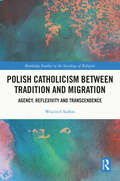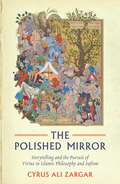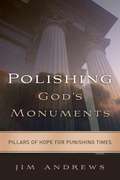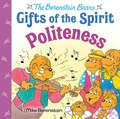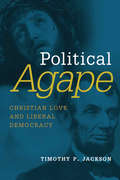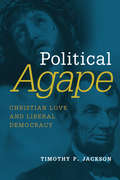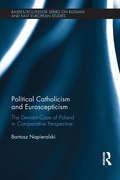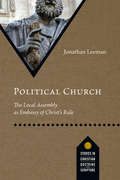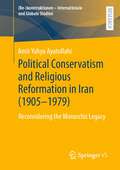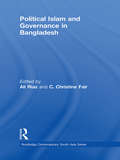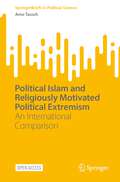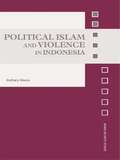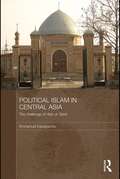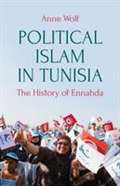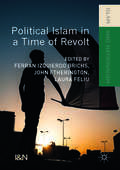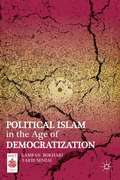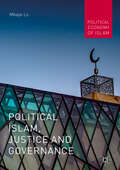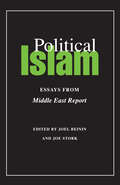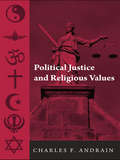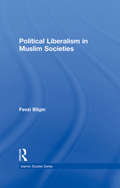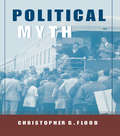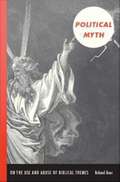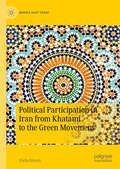- Table View
- List View
Polish Catholicism between Tradition and Migration: Agency, Reflexivity and Transcendence (Routledge Studies in the Sociology of Religion)
by Wojciech SadlonFrom a critical realist perspective, this book examines the manner and the extent to which religion is shaped by modernity. With a focus on Poland, one of the most monolithic and religiously active Catholic societies in the world – but which has undergone periods of intense transformation in its recent history – the author explores the transformations that have affected Catholicism from a position of reflexivity. Viewing Catholicism as a system of ideas elaborated by tradition, the author considers the relationship between human subjectivity and social structure by examining the shift from traditional religious practice to modern religious observance, particularly in an era of migration in which many Polish Catholics have relocated to western European countries, with profound changes in their religious outlook. Presenting a new approach to understanding religious change from the perspective of religious reflexivity, Polish Catholicism between Tradition and Migration will appeal to scholars across the social sciences with interests in religion, research methods, social change and critical realist thought.
Polish Jewish Culture Beyond the Capital: Centering the Periphery
by Zehavit Stern Ela Bauer Naomi Seidman Daniel Kupfert Heller Marcos Silber Justin Cammy Eugenia Prokop-Janiec Bozena Shallcross Malgorzata Stolarska-Fronia Magdalena Kozlowska Sylwia Jakubczyk-Sleczka Alicja Maslak-MaciejewskaPolish Jewish Culture beyond the Capital: Centering the Periphery is a path-breaking exploration of the diversity and vitality of urban Jewish identity and culture in Polish lands from the second half of the nineteenth century to the outbreak of the Second World War (1899–1939). In this multidisciplinary essay collection, a cohort of international scholars provides an integrated history of the arts and humanities in Poland by illuminating the complex roles Jews in urban centers other than Warsaw played in the creation of Polish and Polish Jewish culture. Each essay presents readers with the extraordinary production and consumption of culture by Polish Jews in literature, film, cabaret, theater, the visual arts, architecture, and music. They show how this process was defined by a reciprocal cultural exchange that flourished between cities at the periphery—from Lwów and Wilno to Kraków and Łódź—and international centers like Warsaw, thereby illuminating the place of Polish Jews within urban European cultures. Companion website (https://polishjewishmusic.iu.edu)
Polished Mirror: Storytelling and the Pursuit of Virtue in Islamic Philosophy and Sufism
by Cyrus Ali ZargarIslamic philosophy and Sufism evolved as distinct yet interweaving strands of Islamic thought and practice. Despite differences, they have shared a concern with the perfection of the soul through the development of character. In The Polished Mirror, Cyrus Ali Zargar studies the ways in which, through teaching and storytelling, pre-modern Muslims lived, negotiated, and cultivated virtues. Examining the writings of philosophers, ascetics, poets, and saints, he locates virtue ethics within a dynamic moral tradition. Innovative, engaging, and approachable, this work – the first in the English language to explore Islamic ethics in the fascinating context of narrative – will be a valuable resource for both students and scholars.
Polishing God's Monuments: Pillars of Hope for Punishing Times
by Jim AndrewsPolishing God's Monuments is the true story of a young woman and her devoted husband who face it all (and then some) as a baffling, mind-boggling illness hijacks their youth and shatters their dreams. Polishing God's Monuments blends straightforward theology with the account of this young couple's afflictions. A sober reality in the life of faith is that "through many tribulations we must enter the kingdom of God." God's people are buffeted in two ways: sometimes we suffer for the faith and other times we suffer with faith. Either way, our faith remains a work in progress. In the midst of troubles, our emotions can vacillate between hope and despair, submission and rebellion. Our understanding can alternate between moments of comprehension and times of total confusion. This book confronts these issues head-on and offers believers biblical perspective, practical direction, and sustaining hope.
Politeness (Berenstain Bears Gifts of the Spirit)
by Mike BerenstainGramps loves to play his violin, but unfortunately, he isn't very good! Brother, Sister and Honey Bear learn that being polite is more than just saying 'Please' and 'Thank you' in this humorous Berenstain Bears Gifts of the Spirit storybook!Kids ages 3 to 7 will enjoy this sweet, faith-based story filled with fun, colorful illustrations—it&’s the perfect read-aloud for any day! The Berenstain Bears Gifts of the Spirit series celebrates the joy of faith, family, and friends—values essential to a wholesome and fulfilling life!This 32-page hardcover storybook, created by Mike Berenstain, son of Stan and Jan Berenstain, includes a soon-to-be classic story about being polite. When Gramps finds his old violin, the cubs are happy to listen. But when they hear Gramps play, they must learn how to choose kind words and be polite!
Political Agape: Christian Love and Liberal Democracy (Emory University Studies in Law and Religion)
by Timothy P. JacksonWhat is the place of Christian love in a pluralistic society dedicated to “liberty and justice for all”? What would it mean to take both Jesus Christ and Abraham Lincoln seriously and attempt to translate love of God and neighbor into every quarter of life, including law and politics?Timothy Jackson here argues that agapic love of God and neighbor is the perilously neglected civil virtue of our time -- and that it must be considered even before justice and liberty in structuring political principles and policies. Jackson then explores what “political agape” might look like when applied to such issues as the death penalty, same-sex marriage, and adoption.
Political Agape: Christian Love and Liberal Democracy (Emory University Studies in Law and Religion)
by Timothy P. JacksonWhat is the place of Christian love in a pluralistic society dedicated to “liberty and justice for all”? What would it mean to take both Jesus Christ and Abraham Lincoln seriously and attempt to translate love of God and neighbor into every quarter of life, including law and politics?Timothy Jackson here argues that agapic love of God and neighbor is the perilously neglected civil virtue of our time -- and that it must be considered even before justice and liberty in structuring political principles and policies. Jackson then explores what “political agape” might look like when applied to such issues as the death penalty, same-sex marriage, and adoption.
Political Catholicism and Euroscepticism: The Deviant Case of Poland in Comparative Perspective (BASEES/Routledge Series on Russian and East European Studies)
by Bartosz NapieralskiThis book explores the phenomena of both Political Catholicism and the growth of Euroscepticism across Eastern and Western Europe. It focuses in particular on Political Catholicism in Poland, but sets this in its wider European context. It examines the nature of Political Catholicism as a political movement, discusses the circumstances in which Political Catholicism, which has traditionally been pro-European, can turn to being Eurosceptic, and argues that Political Catholicism in Poland is a special case because of its Catholic-nationalist nature. The book concludes by assessing the role religion plays in the politics of modern Europe and outlines the implications for the future studies of European integration.
Political Church: The Local Assembly as Embassy of Christ's Rule (Studies in Christian Doctrine and Scripture)
by Jonathan LeemanThe church is political. Theologians have been debating this claim for years. Liberationists, Anabaptists, Augustinians, neo-Calvinists, Radical Orthodox and others continue to discuss the matter. What do we mean by politics and the political? What are the limits of the church's political reach? What is the nature of the church as an institution? How do we establish these claims theologically? Jonathan Leeman sets out to address these questions in this significant work. Drawing on covenant theology and the "new institutionalism" in political science, Leeman critiques political liberalism and explores how the biblical canon informs an account of the local church as an embassy of Christ's kingdom. Political Church heralds a new era in political theology.
Political Conservatism and Religious Reformation in Iran: Reconsidering the Monarchic Legacy ((Re-)konstruktionen - Internationale und Globale Studien)
by Amir Yahya AyatollahiThis book is a theoretical inquiry on the relation of the body politic with the religious movements in the time between the Constitutional Revolution and the Islamic Revolution in Iran; it illustrates speculative and historical analyses on the relationship of state, religion, and socio-political status in the late Qajar dynasty (1905-1925) and the whole Pahlavi monarchy. Particularly, it examines the applicability of “liberal conservatism” to the era of the last Shah of Iran. The thesis defines the term political conservatism in accord with Edmund Burke’s philosophy. It deals next with the definition of religious reformation, the peculiar characteristics of Islam, the Shi'ite political theology, and the contradictory usages of “Islamic reformation” in the literature. The text gives an overview of the two antagonist sides of nationalism. It provides also an analysis of the Islamic Republic as a new political phenomenon in Iranian history and the transformation of all concepts after 1979. Ayatollahi aims to assess the Iranian conservatism, the possibility of conciliation between politics and religion before the collapse of the Pahlavi, and “the conditions of possibility” for any restoration of the monarchy.
Political Islam and Governance in Bangladesh (Routledge Contemporary South Asia Series)
by Ali RiazThe past decade has seen a marked policy focus upon Bangladesh, home to nearly 150 million Muslims; it has attracted the attention of the world due to weak governance and the rising tide of Islamist violence. This book provides a broad-ranging analysis of the growth and impact of "political Islam" in Bangladesh, and reactions to it. Grounded in empirical data, experts on Bangladesh examine the changing character of Bangladeshi politics since 1971, with a particular focus on the convergence of governance, Islamism and militancy. They examine the impacts of Islamist politics on education, popular culture and civil society, and the regional and extraregional connections of the Bangladeshi Islamist groups. Bringing together journalists and academics - all of whom have different professional and methodological backgrounds and field experiences which impact upon these issues from different vantage points - the book assesses Bangladesh’s own prospects for internal stability as well as its wider impact upon South Asian security. It argues that the political environment of Bangladesh, the appeal of Islamist ideology to the general masses and the dynamic adaptability of Islamist organizations all demonstrate that Bangladesh will continue to focus the attention of policy makers and analysts alike. This is a timely, incisive and original explanation of the rise of political Islam and Islamic militancy in Bangladesh.
Political Islam and Religiously Motivated Political Extremism: An International Comparison (SpringerBriefs in Political Science)
by Arno TauschThis open access book presents an international comparison of religiously motivated extremism in the Arab world and around the globe. Based on data from the Arab Barometer and the World Values Survey, it applies advanced statistical techniques to analyze how religiously motivated political extremism affects political and social outcomes as well as political violence. The study clearly shows that identification with a political Islam that also influences elections, promotes religious and gender discrimination, and advocates an Islamist interpretation of Islam, are the main interrelated syndromes of political Islam that together explain more than 50% of the total variance of the 24 model variables used.“A carefully and methodically flawlessly researched work, which is highly recommended for all those who deal seriously with this topic. Professor Arno Tausch is clear-headed and possesses a remarkable ability to make the broad picture of Political Islam accessible.“Hon. Prof. Gunther Hauser, Head of the Department Strategy and Security Policy, National Defense Academy, Vienna, Austria“Methodological rigorous, scientifically sound, empirically rich and combining the best of qualitative and quantitative approaches, Prof Arno Tausch has produced a tour de force on Political Islam. This study reflects the best scholarship on the subject and will be of use to both policy makers and academics.”Prof Hussein Solomon, Academic Head of the Department of Political Studies and Governance, University of the Free State, South Africa
Political Islam and Violence in Indonesia (Asian Security Studies)
by Zachary AbuzaPolitical Islam and Violence in Indonesia presents a penetrating new investigation of religious radicalism in the largest Muslim country in the world. Indonesia is a country long known for its diversity and tolerant brand of Islam. However, since the fall of Suharto, a more intolerant form of Islam has been growing, one whose adherents have carried out terrorist attacks, waged sectarian war, and voiced strident anti-Western rhetoric. Zachary Abuza’s unique analysis of radical Islam draws upon primary documents such as Jemaah Islamiyah’s operations manual, interviews, and recorded testimonies of politicians, religious figures, and known militants, as well as personal interviews with numerous security and intelligence experts in Indonesia and elsewhere, to paint a picture at once guardedly optimistic about the future of Indonesian democracy and concerned about the increasing role of conservative and radical Islam in Indonesian society. This book will be of great interest to students of Indonesian politics, Asian studies, political violence and security studies in general.
Political Islam in Central Asia: The challenge of Hizb ut-Tahrir (Central Asian Studies #Vol. 21)
by Emmanuel KaragiannisThe terrorist attacks in the United States on 9/11 and the U.S.-led military campaign against the Taliban regime in Afghanistan have intensified scrutiny of radical Islamic groups across Central Asia. This books offers one of the first comprehensive studies of the activities of one of the most feared - but least understood - inernational Islamist organizations in post-Soviet Central Asia: Hizb ut-Tahrir, that is The Party of Islamic Liberation. By utilizing social movement theory, the book analyses political Islam in Central Asia in general, and the phenomenon of Hizb ut-Tahrir in particular. It reveals the critical role of its ideology (based on a selective interpretation of Islamic theology and history) in the party’s recruiting success. Using primary sources, including the group’s publications and documents, official reports, alongside interviews with scholars, security experts, mullahs, journalists, diplomats, government officials and group members, it covers the rise of political Islam in the post-Soviet Central Asia, alongside the origins and current status of Hizb ut-Tahrir - its leadership, ideology, political methodology and party structure and its rise in the region from Kazakhstan to Russia and China. Although the organization has received less international examination partly because it has advocated a non-violent approach toward its goals, this book sketches its prospective future relationship to violence in this key region.
Political Islam in Tunisia: The History of Ennahda
by Anne WolfPolitical Islam in Tunisia uncovers the secret history of Tunisia's main Islamist movement, Ennahda, from its origins in the 1960s to the present. Banned until the popular uprisings of 2010-11 and the overthrow of Ben Ali's dictatorship, Ennahda has until now been impossible to investigate. This is the first in-depth account of the movement, one of Tunisia's most influential political actors.Based on more than four years of field research, over 400 interviews, and access to private archives, Anne Wolf masterfully unveils the evolution of Ennahda's ideological and strategic orientations within changing political contexts and, at times, conflicting ambitions amongst its leading cadres. She also explores the challenges to Ennahda's quest for power from both secularists and Salafis. As the first full history of Ennahda, this book is a major contribution to the literature on Tunisia, Islamist movements, and political Islam in the Arab world. It will be indispensable reading for anyone seeking to understand the forces driving a key player in the country most hopeful of pursuing a democratic trajectory in the wake of the Arab Spring.
Political Islam in a Time of Revolt
by Ferran Izquierdo Brichs John Etherington Laura FeliuThis book explores the increasing political and social prominence of Islamist groups across the Middle East in recent years. The aftermath of the 2011 uprisings saw some groups access or even control political institutions through success at the ballot box, while there has also been a marked resurgence of armed Islamist groups that have had profound effects at both the national and regional level. This volume helps us to understand the nature and development of organised political Islam over recent decades in several key Arab and Mediterranean countries: Mauritania, Morocco, Algeria, Tunisia, Libya, Egypt, Syria, Lebanon, the Palestinian Territories, and Turkey. The book identifies the central social and political Islamist actors, traces their ideological differences and similarities, and analyses power relations both within and between these organizations in the context of political instability and uncertainty. It will be of interest to students and scholars across a broad range of disciplines including political science, sociology, and international relations.
Political Islam in the Age of Democratization
by Kamran Bokhari Farid SenzaiThe continued prominence of Islam in the struggle for democracy in the Muslim world has confounded Western democracy theorists who largely consider secularism a prerequisite for democratic transitions. Kamran Bokhari and Farid Senzai offer a comprehensive view of the complex nature of contemporary political Islam and its relationship to democracy.
Political Islam, Iran, and the Enlightenment
by Ali MirsepassiAli Mirsepassi's book presents a powerful challenge to the dominant media and scholarly construction of radical Islamist politics, and their anti-Western ideology, as a purely Islamic phenomenon derived from insular, traditional, and monolithic religious "foundations. " It argues that the discourse of political Islam has strong connections to important and disturbing currents in Western philosophy and modern Western intellectual trends. The work demonstrates this by establishing links between important contemporary Iranian intellectuals and the central influence of Martin Heidegger's philosophy. We are also introduced to new democratic narratives of modernity linked to diverse intellectual trends in the West and in non-Western societies, notably in India, where the ideas of John Dewey have influenced important democratic social movements. As the first book to make such connections, it promises to be an important contribution to the field and will do much to overturn some long-held and pervasive assumptions about the dichotomy between East and West.
Political Islam, Justice and Governance (Political Economy of Islam)
by Mbaye LoThis book argues that political Islam (represented by its moderate and militant forms) has failed to govern effectively or successfully due to its inability to reconcile its discursive understanding of Islam, centered on literal justice, with the dominant neo-liberal value of freedom. Consequently, Islamists' polities have largely been abject, often tragic failures in providing a viable collective life and sound governance. This argument is developed theoretically and supported through a set of case studies represented by the Muslim Brotherhood in Egypt (under President Muhammad Morsi’s tenure), Hassan Turabi's National Islamic Front in Sudan and The Islamic State in Iraq and Syria (ISIS). It is ideal for audiences interested in Regional Politics, Islamic Studies and Middle Eastern Studies.
Political Islam: Essays from <i>Middle East Report</i>
by Joel Beinin Joe StorkThe essays and case studies collected here—featuring some of the best material from Middle East Report over the past decade as well as much original material—challenge the facile generalizations about what Western media and political establishments usually call "Islamic fundamentalism." The authors demonstrate the complexity of these movements and offer complementary and contrasting interpretations of their origins and significance. The material included covers a broad range of themes—including democracy and civil society, gender relations and popular culture—as they have emerged in countries throughout the Middle East and North Africa.
Political Justice and Religious Values (Sociology Re-Wired)
by Charles AndrainWhy do individuals and groups hold distinctive theological views? Why do these beliefs change? In what ways do theological interpretations influence concepts of spiritual and political justice? How and why do these concepts of justice affect policy preferences held by religious liberals and conservatives? Much has recently been written about the relationship between power, conservative politics, and evangelical religious groups, but very little attention has been paid to so-called "progressive" religious groups among Protestants, Catholics, and Jews and their relationship to political thought and action. This wide-ranging and interdisciplinary work, ideal for use in college courses on religion and social issues, explores the impact of theological interpretations about God, the individual, society, church, and government on attitudes toward procedural and distributive justice. Major issues revolve around civil liberties, sexual choice, gender equality, world peace, prison reform, and income distribution
Political Liberalism in Muslim Societies (Routledge Islamic Studies Series)
by Fevzi BilginHaving survived the process of modernization and reasserted themselves in public life, religious traditions play an increasingly important public role in shaping and defining social institutions and interactions. This book examines Rawls’s theory of political liberalism in the context of Muslim societies, where religion wields a significant social and political influence. Contrasting a sociological analysis with a theoretical approach, the author explores the political questions brought up by religious individuals, organizations, and minorities, and examines fundamental notions such as neutrality of state, public/private distinction, and individual autonomy. Offering a rich set of conceptual and normative instruments, the author presents new ways to incorporate political liberalism into political discourses and advocating policy prescriptions for the advancement of democracy in Muslim societies. Independent of the focus on Muslim societies, this book makes a significant contribution to the political liberalism debate. As such, it will be of interest not only to students of Islam and the Middle East, but also to those with an interest in political philosophy, democracy, religion and contemporary political theory.
Political Myth (Theorists of Myth)
by Christopher FloodFirst Published in 2002. Routledge is an imprint of Taylor & Francis, an informa company.
Political Myth: On the Use and Abuse of Biblical Themes
by Roland BoerIn this provocative and necessary work, Roland Boer, a leading biblical scholar and cultural theorist, develops a political myth for the Left: a powerful narrative to be harnessed in support of progressive policy. Boer focuses on foundational stories in the Hexateuch, the first six books of the Bible, from Genesis through Joshua. He contends that the "primal story" that runs from Creation, through the Exodus, and to the Promised Land is a complex political myth, one that has been appropriated recently by the Right to advance reactionary political agendas. To reclaim it in support of progressive political ends, Boer maintains, it is necessary to understand the dynamics of political myth. Boer elaborates a theory of political myth in dialogue with Ernst Bloch, Theodor Adorno, Alain Badiou, Jacques Lacan, and Slavoj Žižek. Through close readings of well-known biblical stories he then scrutinizes the nature of political myth in light of feminism, psychoanalysis, and Marxism. Turning to contemporary politics, he examines the statements of prominent American and Australian politicians to show how the stories of Creation, conquest, Paradise, and the Promised Land have been distorted into a fantasy of Israel as a perpetual state in the making and a land in need of protection. Boer explains how this fantasy of Israel shapes U. S. and Australian foreign and domestic policies, and he highlights the links between it and the fantasy of unfettered global capitalism. Contending that political myths have repressed dimensions which if exposed undermine the myths' authority, Boer urges the Left to expose the weakness in the Right's mythos. He suggests that the Left make clear what the world would look like were the dream of unconstrained capitalism to be realized.
Political Participation in Iran from Khatami to the Green Movement (Middle East Today)
by Paola RivettiThis book examines the unintended consequences of top-down reforms in Iran, analysing how the Iranian reformist governments (1997–2005) sought to utilise gradual reforms to control independent activism, and how citizens responded to such a disciplinary action. While the governments successfully ‘set the field’ of permitted political participation, part of the civil society that took shape was unexpectedly independent. Despite being a minority, independent activists were not marginal: without them, in fact, the Green Movement of 2009 would not have taken shape. Building on in-depth empirical analysis, the author explains how autonomous activism forms and survives in a semi-authoritarian country. The book contributes to the debate about the implications of elite-led reforms for social reproduction, offering an innovative interpretation and an original analysis of social movements from a political science perspective.
